
October is Domestic Violence Awareness Month (DVAM), and this is a time dedicated to an issue that affects millions of people worldwide. But…how did DVAM come to be, and why is it so important?
Well, DVAM started in 1981 as a “Day of Unity” and was created by the National Coalition Against Domestic Violence (NCADV). The goal of this was to unite advocates across the country who were working to end violence against women and their families. Over time, that single day evolved into an entire month of awareness, education, and advocacy.
Then in 1987, DVAM was officially recognized as a national month of observance. This was also the same year the first national domestic violence toll-free hotline was established, making it easier for survivors to seek help. Since then, DVAM has grown into a movement aimed at breaking the silence around domestic violence,
advocating for stronger protections, and providing resources for survivors.
The history behind DVAM is definitely a reminder of how far we’ve come but also how much work still needs to be done. Domestic violence isn’t just a personal issue—it’s a societal one. By raising awareness and starting conversations, we can help create a world where everyone feels safe both in their homes and relationships.
Now every October, you may see purple worn or displayed to show solidarity with survivors and to remember those who have lost their lives to domestic violence. But awareness is only part of the solution. We also need to push for change year-round by supporting policies and organizations that help survivors, educating ourselves
and others and challenging the norms that allow abuse to persist. So, while DVAM is a time to come together and focus on this critical issue, let’s carry that energy forward, keeping the conversation going and continuing the fight for a world free from domestic violence and abuse.
If you or someone you love is in need of support due to domestic violence, please reach out to: Domestic Violence Support | National Domestic Violence Hotline (thehotline.org)
